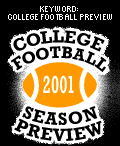 |
 
|
| Tuesday, August 21 Assistants get it done in many ways By Kirk Herbstreit Special to ESPN.com |
||||||||||
|
There isn't a great head coach in the country who doesn't have a great staff. Sure, the head coach is the figurehead and the one who is accountable. But every head coach who is able to dominate has had coordinators and assistant coaches that have helped put systems together, helped recruit, and done things that the head coach gets a lot of credit for and gets paid a lot of money to do. Like all styles, coaching styles are cyclical. Throughout the 1990s, the trend was toward delegating, with head coaches giving a lot of power to their coordinators. The head coach would come around on game day, and often the players were wondering, "Who's this guy?" That consigning style was criticized, and the trend has shifted back to the hands-on approach with more head coaches getting more involved. Good coordinators aren't just about diagramming a great offense or defense. They need to understand the importance of communicating with people -- they need to get to know the players. It's important for an assistant to be in the player's face during workouts or practice, constantly communicating with them, but the second they walk off the field, it's equally important for that assistant to put his arm around the player when his head is down. Treating them like a human being, asking them what is wrong, getting to know them from the time they are a true freshman to the time they leave the program is essential. Too often, a coach only knows a player as, "Hey Number 5!" or "That's my strong safety." On a day-to-day basis, the hands on stuff is more the responsibility of the assistants, but all great coaches, assistants or otherwise, need to get to know their players as people. ESPN college football analyst Kirk Herbstreit appears weekly at a campus near you on ESPN's College GameDay. |
| |||||||||